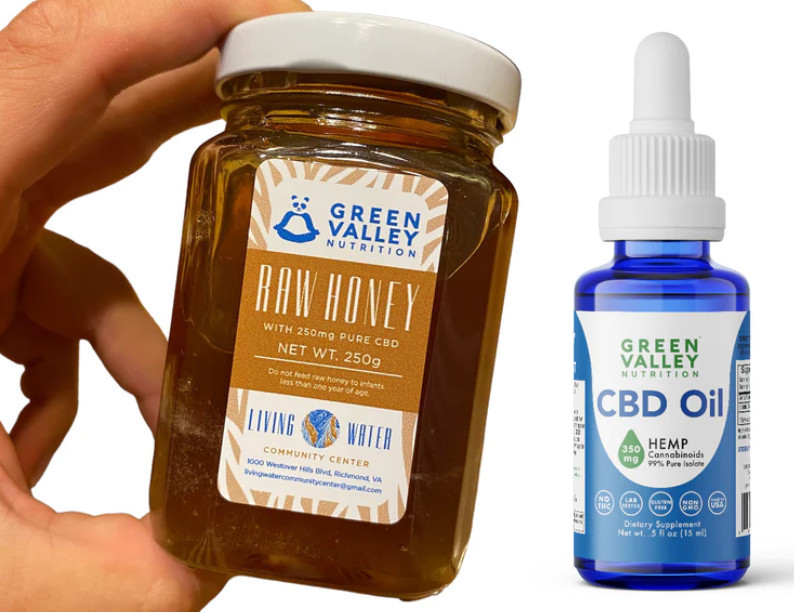 pure cannabidiol (CBD) drops are sold legally, along with other CBD-infused products
pure cannabidiol (CBD) drops are sold legally, along with other CBD-infused productsSource: Green Valley Nutrition, CBD Kids
 pure cannabidiol (CBD) drops are sold legally, along with other CBD-infused products
pure cannabidiol (CBD) drops are sold legally, along with other CBD-infused products
Source: Green Valley Nutrition, CBD Kids
The Virginia General Assembly expanded access to medical marijuana in 2015. The US Congress passed the Agriculture Improvement Act of 2018, opening the door to grow hemp as a crop for fiber.
Producers of cannabidiol (CBD) products quickly took advantage of the availability and public demand for hemp-related products, even though they did not have high enough levels of tetrahydrocannabinol (THC) to create an intoxicating effect. A wide range of health claims were advertised for cannabidiol (CBD) products. They were sold in gas stations and convenience stores, initially with no government oversight or regulation.
Demand grew as constraints in processing capability limited the return on investment for farmers growing agricultural hemp. Even before hemp could be grown legally in Virginia, Green Valley Nutrition began extracting cannabidiol from crops grown in Kentucky. One of its customers was Lamplighter Coffee Roasters in Richmond, which offered to include drops of CBD oil as a "booster" in beverages.
The General Assembly created the Virginia Cannabis Control Authority in 2021, but the process of developing and finalizing regulations required time. In the absence of clear legal restrictions, legally-produced CBD was chemically processed to created Delta-8-THC. There was laboratory process to distinguish "naturally occurring" vs. "synthetic" Delta-8- THC. Since only Delta-9-THC was treated as a regulated intoxicant, the production and sale of products with Delta-8-THC was considered legal - at least by those in the business.
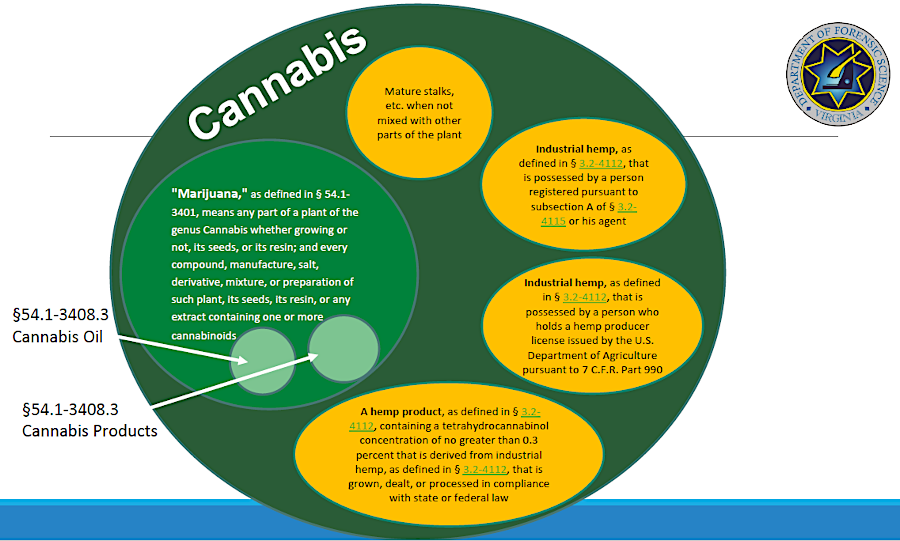 legalization of industrial hemp led to confusion regarding legal status of products infused with Delta-8-THC, which was produced by processing cannabidiol (CBD) derived from hemp
legalization of industrial hemp led to confusion regarding legal status of products infused with Delta-8-THC, which was produced by processing cannabidiol (CBD) derived from hemp
Source: Virginia General Assembly, RD679 - Report of the Task Force to Analyze and Make Recommendations Regarding Whether Any Statutory or Regulatory Modifications are Necessary to Ensure the Safe and Responsible Manufacture and Sale of Industrial Hemp Extracts and Other Substances Containing Tetrahydrocannabinol that are Intended for Human Consumption in the Commonwealth (2022)
Market demand led to unconstrainted manufacturing and packaging of products with Delta-8-THC derived from cannabidiol (CBD). A wide range of items infused with Delta-8-THC were claimed to create more of an "in-your-body" sensation and physical relaxation than intoxication. Stores began selling packages that appeared very similar to popular snack foods and candy, inducing children to ingest potentially dangerous levels. Calls to poison control centers increased significantly.
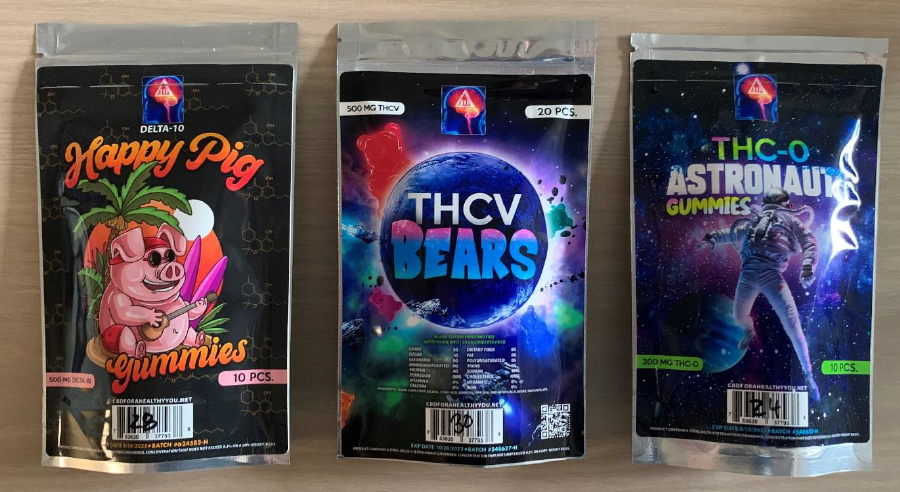 products infused with Delta-8-THC were designed to resemble snack foods
products infused with Delta-8-THC were designed to resemble snack foods
Source: Virginia General Assembly, RD679 - Report of the Task Force to Analyze and Make Recommendations Regarding Whether Any Statutory or Regulatory Modifications are Necessary to Ensure the Safe and Responsible Manufacture and Sale of Industrial Hemp Extracts and Other Substances Containing Tetrahydrocannabinol that are Intended for Human Consumption in the Commonwealth (2022)
The 2022 budget adopted by the General Assembly amended the Virginia Food and Drink Law to make clear that chemically-synthesized cannabinoids were considered to be a food adulterant. Manufacturers adding cannabinoids to products intended to be ingested (swallowed, eaten, or inhaled as opposed to rubbed on the skin) were required to list the amount of THC in each serving on the label.
Start legislators also amended the Virginia Consumer Protection Act. Retailers were prohibited from selling to people under 21 years of age any products with an added industrial hemp extract containing any form of THC.
The Virginia Department of Agriculture and Consumer Services partnered with the Attorney General to enforce the new restrictions, but also stated:1
Under Governor Youngkin, the legality of products with Delta-8 THC remained confusing. At the end of 2022, the Virginia Department of Agriculture and Consumer Services notified stores that they could not sell edibles with any Delta-8 THC. To avoid the risk of being charged with a violation and dealing with expensive legal headaches, Bountiful Utopia in Norfolk and other small stores removed Delta-8 edibles from their shelves. Until the 2023 General Assembly could provide clarification, storeowners had to assess the benefits of selling edible vs. the potential costs if their store was chosen for a legal test case.2
The 2023 legislature split responsibility for regulating hemp-related products. The Cannabis Control Authority retained authority for inhaled products, but the Department of Agriculture and Consumer Services was tasked to regulate food-related products containing up to 0.3% tetrahydrocannabinol (THC).
The Virginia Hemp Coalition opposed the changes made by the 2023 legislature and the Governor, which were designed to stop the sale of products containing enough delta-8 and delta-10 to be intoxicating.
The Virginia Cannabis Association said the new restrictions could force 370 businesses to close. At one point in the debate, a small businessman said:3
In the final version, the General Assembly banned the sale of products that included synthetic Delta-8 and Delta-10 THC. The legislature also required that hemp-derived products must exceed a 25-to-1 ratio of cannabidiol (CBD) to tetrahydrocannabinol (THC), if the package included more than 2mg total of THC. That ban was intended to reduce the potential for legal CBD products to create a marijuana "high."
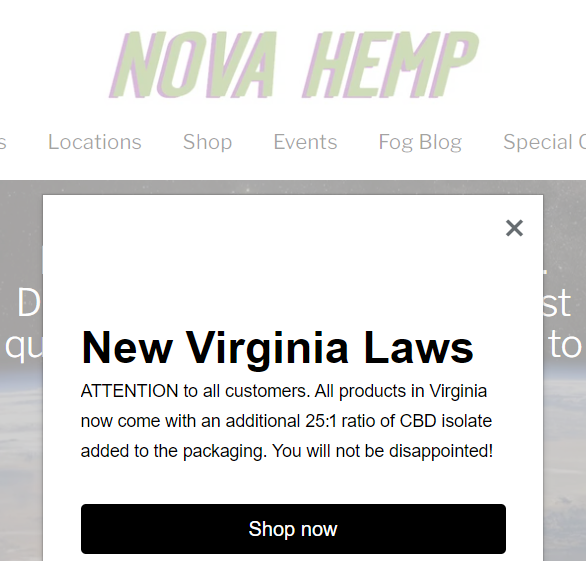 in 2023 stores could sell products with more than 2 milligrams of THC, if the CBD:THC ratio was at least 25:1
in 2023 stores could sell products with more than 2 milligrams of THC, if the CBD:THC ratio was at least 25:1
Source: Northern Virginia Hemp & Agriculture
Each retail store selling authorized, non-intoxicating, edible/inhaled hemp-derived cannabis products was required to pay an annual fee of $1,000 fee per store location. More inspectors were authorized to test products sold to the public, and fines of up to $10,000/day were intended to force businesses to close if they exceeded state limits. By July 1, 2023, stores which had not sold all of their stock of now-banned products were trying to return the excess supply to distributors or sell to stores in other states.
Advocates for sale of hemp products claimed the 2023 legislation violated the Agriculture Improvement Act of 2018. The Virginia Hemp Coalition asserted:4
Business owners impacted by the new restrictions claimed that the 2023 legislation was designed by the medical marijuana companies to put out of business the competitors selling products with synthetic tetrahydrocannabinol (THC), Delta-8 and Delta-9. The limitation of just 2 milligrams per package of tetrahydrocannabinol (THC) was the standard that forced nearly all of the products off store shelves.
Advocates for selling Delta-8 and Delta-9 products noted that the Democratic member of the House of Delegates who championed greater controls, Dawn Adams, owned RVA Telecare. She charged $150 per patient to qualify for access to medical marijuana. In response, she emphasized that her policy position reflected her opinion and expertise, not a desire to drive competitors out of Virginia.
A lobbyist for the Virginia Cannabis Association said:5
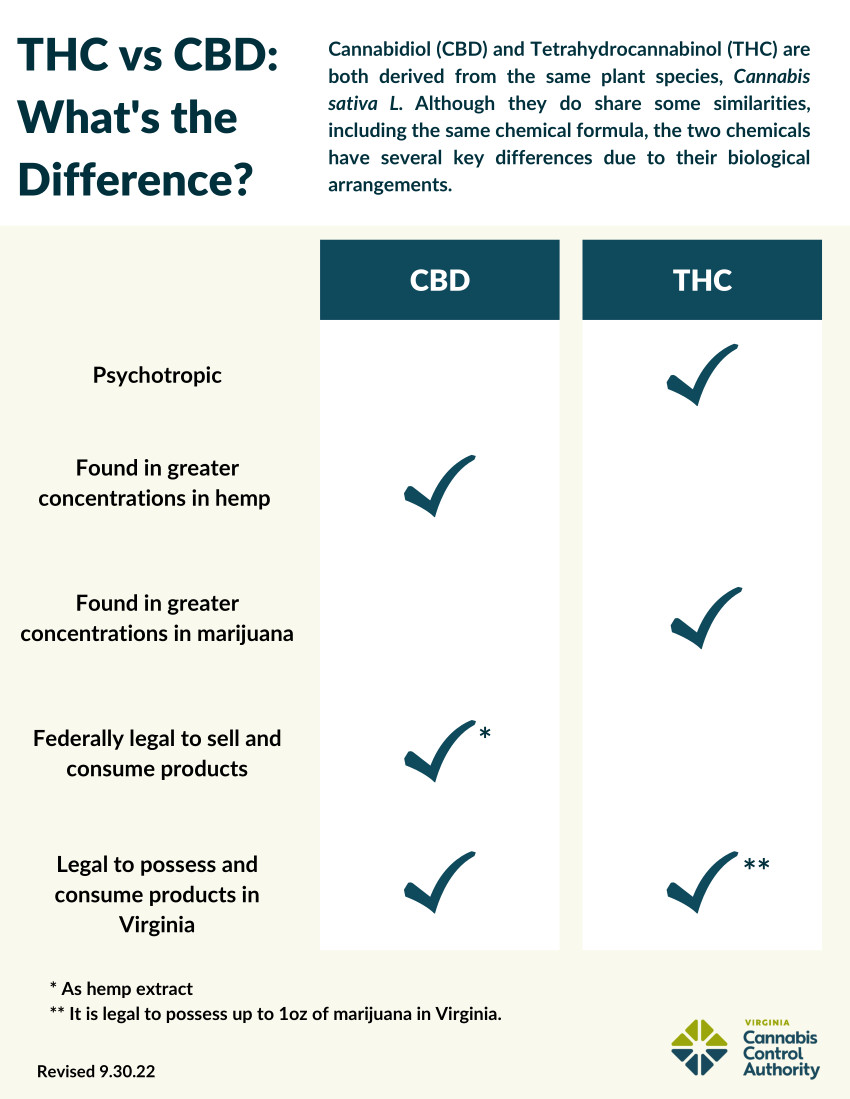 CBD was legal, Delta-9-THC was controlled, and Delta-8-THC was unregulated until 2022
CBD was legal, Delta-9-THC was controlled, and Delta-8-THC was unregulated until 2022
Source: Virginia Cannabis Control Authority, THC vs CBD: What's the Difference?
The new law went into effect on July 1, 2023. By the end of the month, the Virginia Department of Agriculture and Consumer Services (VDACS) had used existing staff to propose that five stores pay fines ranging from $13,000 to $97,500. Stores were charged with selling products that too-closely resembled snacks produced by mainstream companies, or selling products with tetrahydrocannabinol (THC) levels above the 0.3% legal limit.
The state agency had anticipating hiring 15 new inspectors, but a budget dispute at the General Assembly delayed the $2 million in additional funding. However, by September 2023 Virginia Department of Agriculture and Consumer Services inspectors had charged 20 stores and proposed $1.5 million in fines.
One owner of a store selling CBD products said after a visit by state agents:6
Two companies selling Delta-9 products filed a lawsuit claiming the General Assembly had exceeded its authority to regulate agricultural products authorized by the Agriculture Improvement Act of 2018. A Federal judge rejected the request for an injunction to block enforcement of the state regulations. The judge ruled that products with a Delta-9 concentration exceeding 0.3% were still Schedule 1 controlled substance under Federal law, and the while the Agriculture Improvement Act of 2018 prohibited the state from limiting the interstate transport of industrial hemp, the Federal law did not preempt Virginia's authority to regulate manufacturing and sale of industrial hemp products.
The U.S. Court of Appeals for the Fourth Circuit ruled in January, 2025 that SB903, enacted by the General Assembly in 2023, did not conflict with Federal laws. Plaintiffs, including Northern Virginia Hemp and Agriculture, had argued that the state law interfered with interstate commerce because the 2018 Farm Bill had not restricted delta-8 products. The appeals court ruling stated that Virginia was entitled to create more restrictive rules concerning hemp production to address local health and safety concerns.7
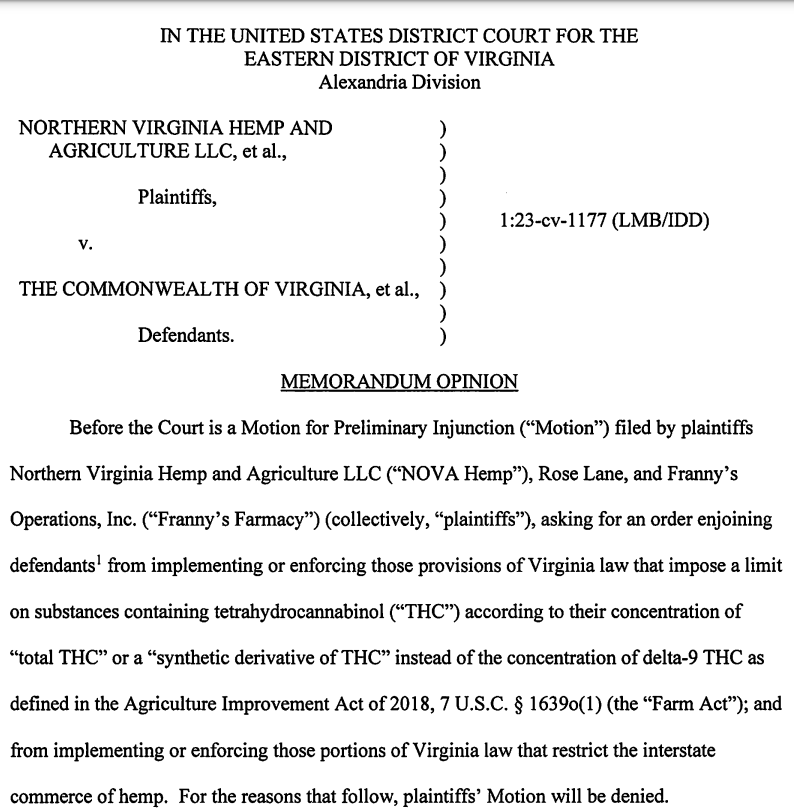 in 2023 a Federal judge allowed Virginia to keep prohibiting hemp-derived products with a less than 25-to-1 ratio of cannabidiol (CBD) to tetrahydrocannabinol (THC)
in 2023 a Federal judge allowed Virginia to keep prohibiting hemp-derived products with a less than 25-to-1 ratio of cannabidiol (CBD) to tetrahydrocannabinol (THC)
Source: US District Court for the Eastern District of Virginia, Northern Virginia Hemp and Agriculture LLC v. The Commonwealth of Virginia (October 30, 2023)
By comparison, Maryland took a different approach than Virginia. Maryland's General Assembly authorized sale of recreational marijuana by all existing medical marijuana dispensaries, creating a legal market with a large number of sales outlets starting July 1, 2023. The first month showed almost a 100% increase in legal cannabis sales, from $43 million in July 2022 to $84 million in July 2023.8
The confusion regarding what was legal and the low priority placed on enforcement enabled entrepreneurs to open stores where marijuana was distributed as rolled cigarettes and in other forms, with transactions represented as "sharing" or "gifting" rather than as "purchasing." By September 2023, there were 10 The Good Vibes "pop up" shops in Abingdon, Blacksburg, Bluefield, Bristol, Marion, Radford, Roanoke County and Wytheville.
According to the law, it was legal for adults at least 21 years old to share one ounce or less of marijuana, so long as the transfer was done privately. In the pop up marijuana shops, legal sales of different commodities were followed by, according to the participants, a "sharing" done voluntarily between two adults.
The editor of Cardinal News discovered that a $10 purchase would be followed by sharing of one gram of marijuana with 15.86% THC, far above the legal threshold of 0.3%. The "shared" product also had mold, suggesting it was grown indoors. It had apparently been microwaved so heat would convert delta 9 THCA to the intoxicating delta 9 THC, based on the unusual ratio of more delta 9 THC than the precursor delta 9 THCA.
Law enforcement officials in 2023 described the marijuana distribution process as a "Wild West" of unregulated behavior. A drug bust in Russell County was a rare event. Three people were arrested at the "Let's Grow" store in Lebanon. Action by the county sheriff and Virginia State Police may have been triggered because the store was close to Lebanon High School, and the transaction process was blatant selling of marijuana.
A representative of the Virginia Cannabis Association said:9
After Youngkin's veto, the Virginia Department of Health announced it was creating a special surveillance system to track cannabis-related hospitalizations in patients under 18 years old:10
HB 2294, which limited tetrahydrocannabinol (THC) to 0.3% and two milligrams per package, went into effect on July 1, 2023. In the next six months, there was a 21.5% decline in pediatric emergency department visits related to cannabis exposure, intoxication and related medical concerns.11
In the first year of enforcement, the Virginia Department of Agriculture and Consumer Services (VDACS) cited 346 stores for violating the law. Fines up to $10 million could have been imposed, but negotiated settlements with stores to remove now-illegal items from shelves reduced the potential penalties.12
Local police officers and sheriff deputies rarely chose to deal with pop-up stores and blatant retail sales of marijuana because there were few complaints. The costs in time and laboratory documentation to prove the contents of a package exceeded 0.3% tetrahydrocannabinol (THC) were too high. The police chief in Marion told a reporter that it was easy to make an arrest when all possession was illegal, but the legal complexity in 2025 made it too hard to justify shutting down what appeared to be flagrant violations against retail sales:13
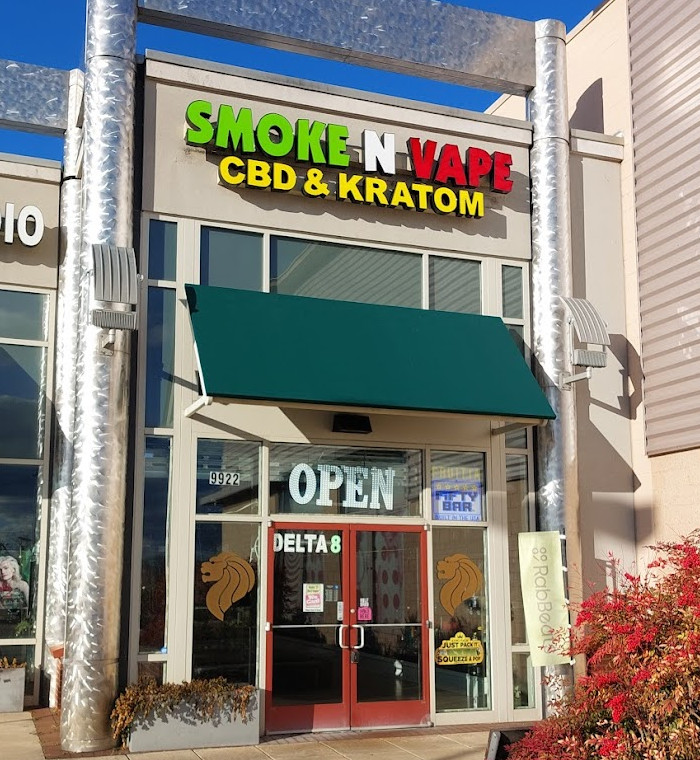 in 2025, vape stores selling Delta-8 products were a common site across Virginia
in 2025, vape stores selling Delta-8 products were a common site across Virginia
The political landscape for illicit sales by vape store changed at the end of 2025. Virginia voters elected Democratic candidate Abgail Spanberger to be the next governor, and increased that party's majority in the House of Delegates. She promised to sign a bill legalizing the sale of marijuana for recreational use.
The proposed language from the General Assembly's Joint Commission on the Future of Cannabis Sales would not allow any local jurisdiction to ban retail sales. "Dry" counties, cities, or towns would retain the economic incentive for an illegal marketplace. The goal was to establish a legal retail system that could sell marijuana at a competitive price and at convenient location, out-competing illicit sales.
In November 2025, the US Congress revised the 2018 Farm Bill and undercut the legal authorization of gas stations, vape stores, and other retail outlets to sell Delta-8 items. The new legislation, scheduled to go into effect in November 2026, banned the sale of products that included high enough concentrations of tetrahydrocannabinol (THC) to have an intoxicating effect.
The Federal ban was expected to reduce the demand for agricultural hemp from farmers who were selling their cannabis to companies that extracted the THC and infused gummies and other items with Delta-8. The 2026 Virginia General Assembly was expected to open a legal market for sale of marijuana for recreational use at roughly the same time as the Federal government closed down the production of Delta-8 products. By the end of 2026, the large number of outlets that in the last few years had been selling Delta-8 products - and often marijuana tainted with chemicals - could be faced with 350 licensed competitors selling a better product.14
The expected impact of that law was quickly offset by a directive from President Trump on December 18, 2025 to reclassify marijuana as a Class III instead of a Class I drug. That process, started under the Biden Administration, has bogged down in the Drug Enforcement Agency's process of writing new Federal regulations based on the Controlled Substance Act.
Reclassification would legalize medical but not recreational use under Federal law. As a medicine regulated under Schedule III, Internal Revenue Code Section 280E would not apply and marijuana-related businesses operating could deduct business expenses on Federal taxes. It was possible that reclassification could also increase access to more standard banking services.15
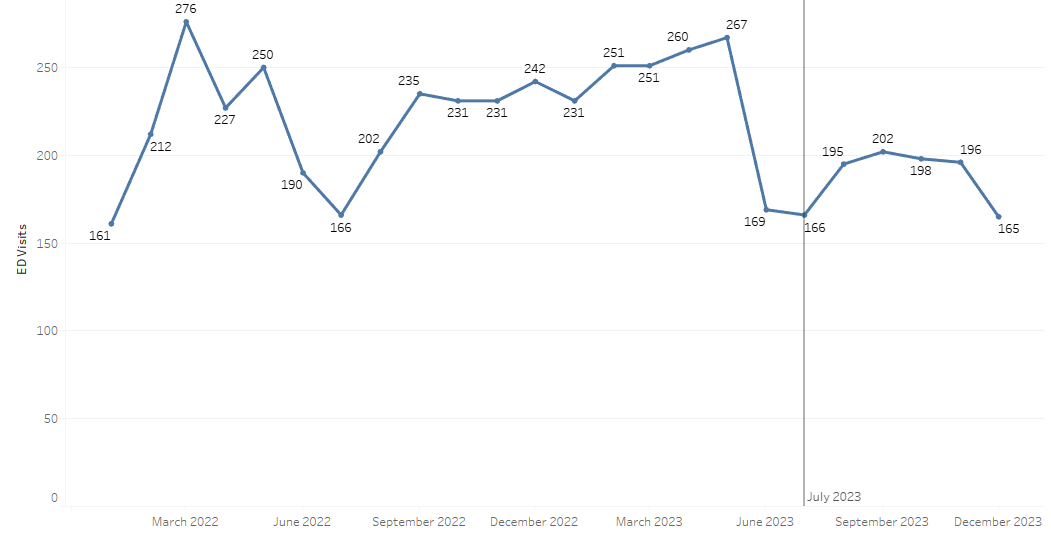 emergency room visits for children impacted by cannabis declined after stores responded to HB 2294
emergency room visits for children impacted by cannabis declined after stores responded to HB 2294
Source: Virginia Hospital and Healthcare Association, Cannabis-Related Hospital Emergency Department Visits Among Pediatric Patients Declined in the Final Six Months of 2023 (May 14, 2024)
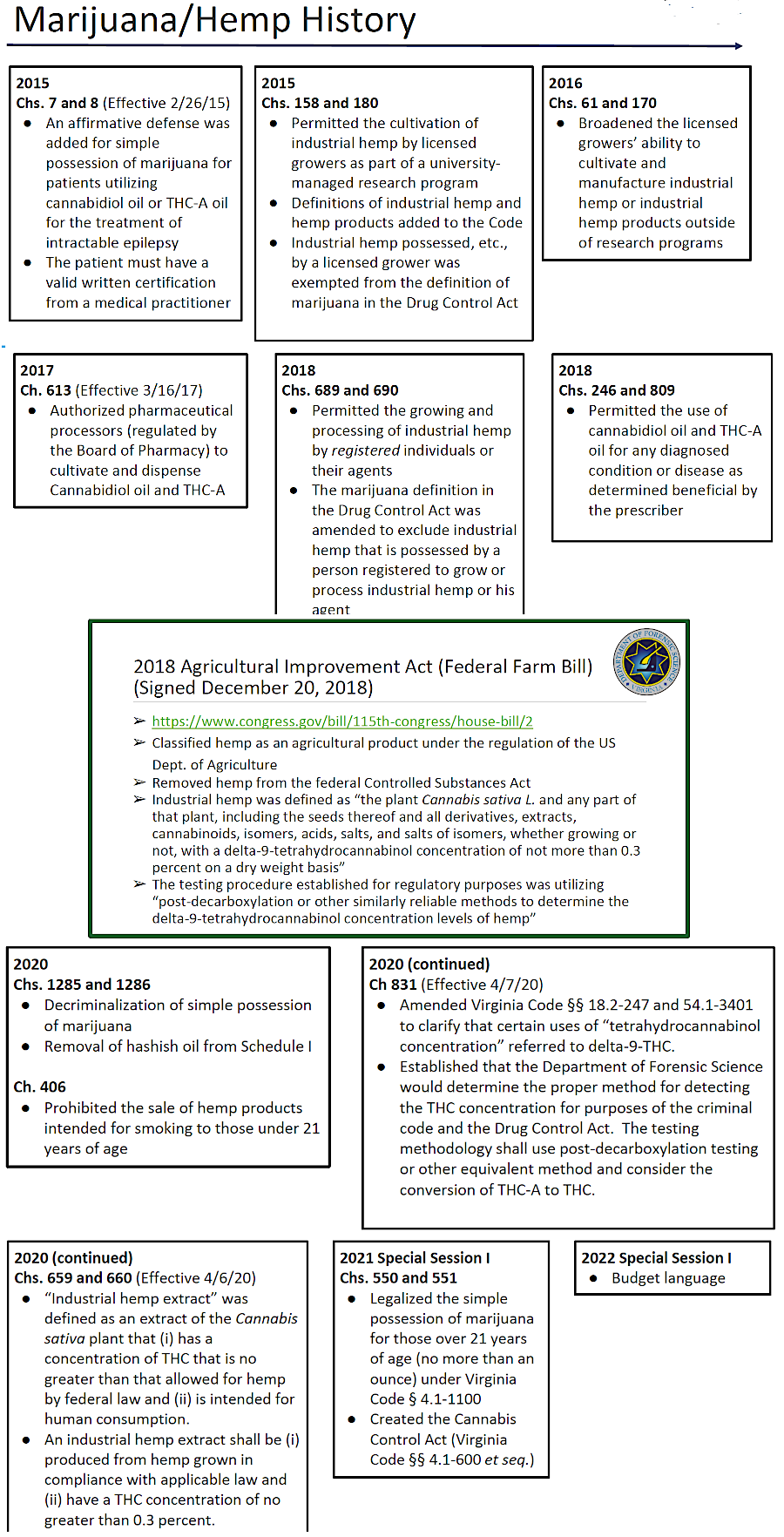 after industrial hemp was legalized, the demand for processing the crop to extract CBD exceeded the demand for fiber/grain
after industrial hemp was legalized, the demand for processing the crop to extract CBD exceeded the demand for fiber/grain
Source: Virginia General Assembly, RD679 - Report of the Task Force to Analyze and Make Recommendations Regarding Whether Any Statutory or Regulatory Modifications are Necessary to Ensure the Safe and Responsible Manufacture and Sale of Industrial Hemp Extracts and Other Substances Containing Tetrahydrocannabinol that are Intended for Human Consumption in the Commonwealth (2022)